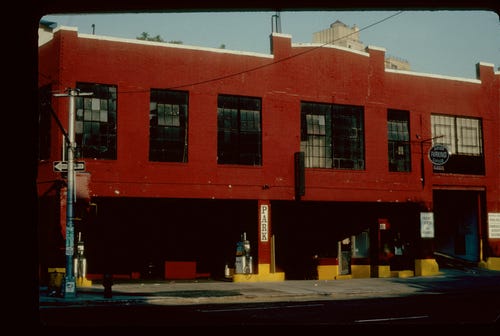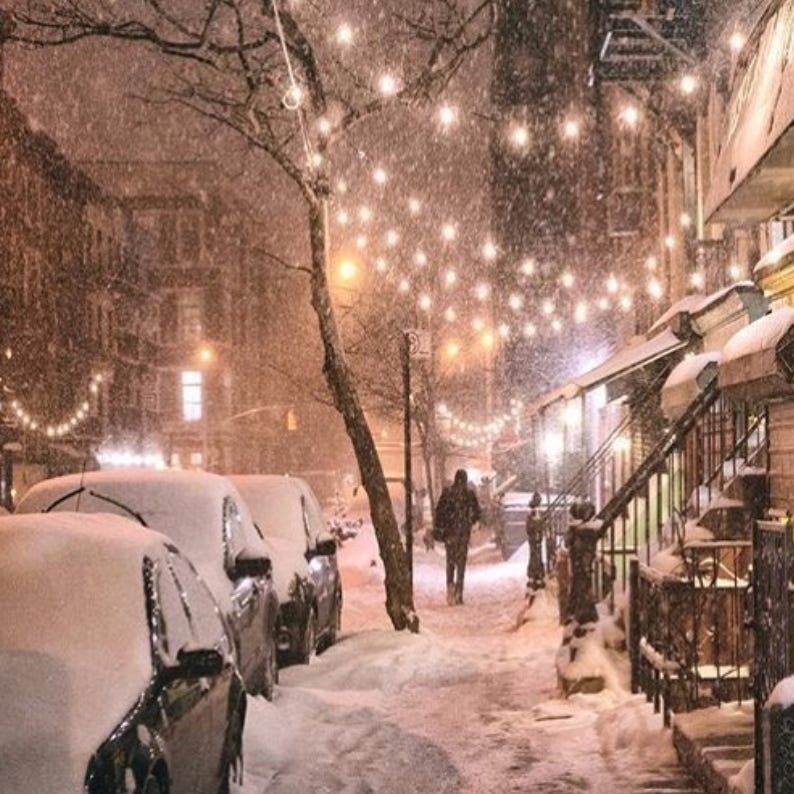Jews work Christmas. That’s been a truism of American economic life as long as I can remember. Over the holidays we are always available for a shift.
In 1975, as Christmas approached I was working as a cab driver in New York City. I had moved to the city four months earlier to live the acting life and was driving to make rent while waiting for the big break that I was certain would come shortly. I drove out of Dover Garage on Hudson Street, in Greenwich Village, a twenty minute walk across town from my apartment on east 12th Street between Second and Third Avenues.
A few days before the holiday, Gene, one of the dispatchers at Dover, asked if I was going to be available on the day.
Sure.
And Christmas Eve?
Absolutely.
When the time came, he gave me three trip sheets, the logs we had to keep of our fares and their destinations, and said keep the cab for a couple of days.
I did.
Easy days they were. After a last minute rush working the airports and train stations, Manhattan was less crowded but it wasn’t less busy. Jews who don’t work Christmas, still celebrate the holiday.
Unlike the drawing down of all activity that characterizes London on Christmas Eve, in New York business was brisk, particularly on the very Jewish Upper West Side. The calls were long: From Riverside Drive crosstown to Park Avenue, downtown to the Village. There were few cabs and less traffic.
I did a night’s business in about four hours. My friend Lee, who rented a room in a loft on Crosby Street in Soho, had invited Christmas orphans, those stuck in town without family or the money to get home, to drop by for egg nog. I had a call to within a few blocks of her place and since I had already booked damned near a hundred dollars went over for a glass.
Lee was an old as well as older friend from college. She had graduated several years ahead of me and our lives kept intersecting by coincidence. We had run into each other on the street a few days after I moved to New York. Totally by chance, by fate, by what Kurt Vonnegut, who we all read back then, called, Karass. An actor’s life is formless and we seek for patterns where there are none. Lee’s return to my life at that moment seemed a sign that I was on the right path.
She had invited me to a party at the loft that very night we had run into each other. The space was long and narrow and was owned by a woman named Roberta, a modern dancer, who was at the center of a scene of jazz musicians and dancers. I got picked up at the party by a divorced woman in her thirties named Lucia, pronounced Loo-shah. Very beautiful. She took me back to her place on Sneden’s Landing, a cliffside enclave on the Hudson, just north of the city for a very intense weekend.
On Monday morning she drove me back to the City and suddenly pulled over by the subway stop at 96th and Broadway and just as abruptly said,
“That was fun but now I have to work. I’ve got to see some clients on the East Side. Can you get downtown from here?”
I could. And I did not feel used.
A light snow was falling on Crosby Street. Soho was empty. In 1975, the area was still primarily a place of light industry without many residents. Snow was attaching itself to empty wooden pallets and soaking in to cardboard packing cases left on the sidewalk for whenever the next industrial rubbish collection might take place.
Finding a parking place was no hassle and I picked my way around the industrial detritus and walked down Crosby wondering if I might get lucky again. The street was deathly quiet. I disturbed the silence and shouted up to Lee and she threw down a sock with the keys to the building stuffed inside.
The fumes of warming bourbon, a key ingredient in her egg nog, had filtered out of Roberta’s space and was drifting down the stairs. There wasn’t much of a crowd and I knew right away I wasn’t getting lucky. It was mostly men. Lee was a powerfully attractive woman who had the gift of turning male suitors into friends.
I spent a few hours sipping her bourbon-laced concoction swapping lies about professional successes with other wannabes. Shortly after midnight one of her guests was going back up town to the West Side, so I took the fare. The snow was dusting down heavily—it wouldn’t last—but New York with its now empty Christmas Eve streets was beautiful, a city kid’s fantasy of a White Christmas. I seemed to be the only cab out and business found me for hours. It was deep into the snow silent night before I parked the cab outside my apartment on east 12th street.
I returned to the streets late on Christmas morning. The snow had pretty much melted away. The cab business is different on Christmas Day. The wealthy are out of town and you can escape the inevitable tidal pull of the Upper East Side. Instead your fares are mostly the people who have very little. Families going to visit relatives, it’s Christmas so they splurge and take taxis.
My trip sheet filled up with calls from my East Village neighbourhood to Spanish Harlem and from Spanish Harlem over the river to the Bronx. The day was dull and overcast but the borough lacked the despair and menace that one usually saw there. The streets weren’t decorated, not at all, they were as grim as ever but the families were animated, the kids cheerful. They brightened the landscape.
Bronx to Queens and Queens to Manhattan, out to Brooklyn and back and most of my business was people who hardly ever took a cab, much less a cab such long distances.
We all cry reading, or more likely watching, A Christmas Carol, then chide Dickens for the story’s sentimentality and ourselves for succumbing to it. But this day, as I worked a New York stripped down to its core of working people, demonstrated the kernel of truth Dickens was tapping into when he wrote that story.
Christmas is a day of blessing for those who have to grind out their living, and nothing can spoil its happiness and spirit of generosity. I got good tips from people who didn’t have much, and expressions of sympathy that I was stuck working. And in the decades of Christmases since, many of them spent working on the holiday, it is the memory of this particular one that brightens these short days of the year.
I hope that this Christmas, or whatever day you find your way to these words, you encounter a similar spirit of generosity in the world from people you don’t know and that you return that grace. Remember, it is your Karass to have met them.








Thanks, Stuart
You got picked up at a party by a beautiful rich woman, taken to her luxury out-of-town residence for a passionate weekend, then dropped back at the city, with no on-going commitment?
America — where dreams come true!